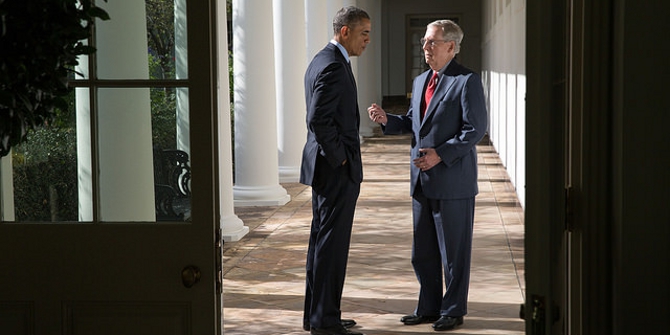USApp Managing Editor, Chris Gilson looks at the best in political blogging from around the Beltway. Our round-up of state blogs will follow on Saturday afternoon.
President Obama, the Democratic Party, and the GOP
This week saw continued commentary and reflection on the Republican Party’s ‘wave’ in last week’s midterm elections. On Saturday, The Lonely Conservative writes that despite what they say has been a ‘rebuke’ for his policies from voters, President Obama is planning on going ahead with more executive action on immigration. The Daily Signal looks at Obama’s planned move, which could come as soon as next week, to protect up to 5 million undocumented immigrants from deportation. They say that Republican leaders plan to fight the move, and that it may even lead to a government shutdown after December 11th, the date by when a new spending bill will need to have been passed.

Despite accusations from right wing commentators that President Obama is defying public opinion after the midterm results, Political Animal writes that his response to the elections has been perfectly normal. They say that it is fairly typical for a President whose party has been defeated in Congress to reassert their own policy commitments. On Monday, Crooks & Liars reports that Obama has called for the ‘strongest possible rules’ to protect net neutrality – meaning legislation to prevent ‘fast lanes’ for content on the web.
While President Obama is staying relatively firm, the same may not be true of the Democratic Party as a whole. The Atlantic writes that while many Democrats have believed that the country’s changing demographics will guarantee victories in the future, the GOP’s midterm victory exposed the limits in the modern Democratic coalition and their increasing lack of appeal to whites.
Moving to the other side of the aisle, RedState writes this week that now that the GOP has won control of Congress in its entirety, conservative activists now need to watch the GOP’s Congressional leadership ‘like a hawk’. They say that they must ensure that the pursuit of the GOP’s agenda is not diluted by any sense of compromise with the flawed President Obama. Hit & Run writes on Sunday that the Republican Party may still ‘blow’ their midterm victory, if they act on symbolic issues and work to pay off their favored constituencies. This week PoliticusUSA reports that aides of Senator Mitch McConnell (who will be Senate Majority Leader in the next Congress) are frustrated with the lack of movement from President Obama after the Democrats’ midterm defeat. They say that Republicans seem to be shocked that Obama has not ‘bowed’ to their ability to win elections in red states, and that the President has no reason to move. On Monday, Crooks & Liars has more on this point, writing that the Tea Party wing of the GOP may be building towards an ‘uprising’ against the establishment wing of the Party (represented by Mitch McConnell and House Speaker John Boehner) because of the latters’ moves towards compromise with Obama.
This week also saw an unexpected climate change deal between the U.S. and China. Talking Points Memo writes on Wednesday that the Republican Party is ‘flustered’ by the deal because their chief argument for the U.S. to not take climate action was China’s lack of movement on the issue.
Elections and the road to 2016
On Saturday, National Journal takes issue with the oft-mentioned argument that money ‘bought’ last week’s midterm elections. They say that while Democrats did do badly, their spending more or last matched that of the Republicans. Other obstacles, such as the hostile Senate map, were more important factors than money. Meanwhile, The American Prospect writes on another reason the Democrats lost so badly – exceptionally low voter turnout. They say that the turnout rate of 36.3 percent of the voting eligible population was the lowest since 1942. On Monday, The Atlantic looks at the GOP’s gay candidates in California and Massachusetts, Carl DeMaio and Richard Tisei, who despite the party’s wave, lost their election races. They say that DeMaio’s campaign was marred by accusations of sexual misconduct by two former staffers.
Why was turnout so low last week? Wonkblog looks at a survey data that suggests that two thirds of people simply did not have time – half because of school or work scheduling conflicts. Perhaps with this in mind, National Journal looks at historic proposals to make Election Day a holiday in order to make voting more convenient.
On Monday, The American Prospect looks at whether or not the Democratic Party will be able to ‘get a true blue majority in 2016 and beyond. They say that now that Democratic Senators in red states are a nearly extinct species the Party may have to try and take control of the Senate in two years’ time without relying on Southern Democrats. Roll Call’s Rothenblog writes this week that while Obama is in his final two years of office, he may still be a factor on the 2016 ballot. They say in previous elections, unpopular Presidents, such as George W. Bush in 2008, have influenced Congressional results against their party, and Obama may be no different.
On Wednesday, The American Prospect looks at the 2016 Republican Primary, and says that it is getting more interesting all the time, especially with former Arkansas Governor, Mick Huckabee looking more and more likely to run, given the upcoming publication of his new book, “God, Guns, Grits, and Gravy”. Daily Kos, meanwhile, writes this week that the recently reelected Governor of Wisconsin, Scott Walker, has left no doubt of his intent to run for the presidency in 2016, stating that while it is his plan to continue as Governor for four years, he will also “see what the future holds”.
This week also saw discussion on potential Democratic candidates for 2016. On Thursday, National Journal looks at how Vermont Independent Senator, Bernie Sanders, might run for the Presidency, writing that he would move the national conversation to the left and push Hillary Clinton (tipped by many to the likely candidate) to address issues such as wealth inequality and campaign finance reform. The Atlantic, meanwhile, looks at another potentially left-wing Democratic candidate in the form of Massachusetts Senator, Elizabeth Warren. They say that her elevation to the Senate Democrats’ leadership team this week raises questions over whether or not she will be co-opted by the establishment.
Government, the Beltway and Congress’ agenda
On Sunday, reflecting on the previous week’s midterm election results, Outside the Beltway warns readers not to expect “anything out of Washington in Obama’s final two years”. They say that despite conciliatory tones from the leadership of both parties, the GOP is likely to step up its oversight hearings over the next two years with an eye on 2016.
On Monday, The Atlantic encourages President Obama to act sooner rather than later to take executive action to limit deportations of undocumented immigrants. They say that while House Speaker John Boehner (OH) has warned that taking such action would ‘poison the well’, the GOP have aggressively opposed Obama’s agenda ever since he became president, and that House Republicans are unlikely to move to pass immigration reform anytime soon. What may be moving through Congress soon is a vote on the Keystone XL pipeline, which would move tar sands oil from Canada to processing facilities in the Gulf of Mexico. PoliticusUSA writes that Senate Democrats have “betrayed their supporters” by scheduling a vote on the pipeline, which appears to be a ploy to boost Louisiana Senator Mary Landrieu’s chances of winning her upcoming runoff election.
This week also saw both parties elect their leadership in Congress. Outside the Beltway reports on Thursday that Mitch McConnell has been re-elected unanimously as leader of Senate Republicans – he will be Majority Leader in the next Congress. Meanwhile, Senator John Tester (MT) was named by current Senate Majority Leader, Harry Reid (AZ) as the chair of the Democratic Senatorial Campaign Committee, according to PoliticusUSA. They say that Tester’s naming is Harry Reid throwing Democratic Blue Dogs ‘a bone’ as he has won two Senate elections in a red state. The Left Coaster is sick of the present Democratic leadership in Congress, and calls for Reid and House Minority Leader, Nancy Pelosi to go, given that they are not questioning President Obama’s unilateral agenda, which may be damaging for the party.

On Saturday, President Obama announced that he has nominated the current U.S Attorney for the Eastern District of New York, Loretta Lynch, as the next Attorney General, to replace the outgoing Eric Holder. Daily Kos writes this week reports that Texas Senator, Ted Cruz, has demanded that the Senate delays its vote to confirm Lynch until the new Senate is sworn in in January. PoliticusUSA reports on Wednesday on a plan being negotiated between Obama and Mitch McConnell which may frustrate Cruz – an agreement to pass important legislation and approve nominations while the Senate is in its lame duck session.
Foreign policy, defense and trade
The big news this week on the foreign policy and trade front was President Obama’s announcement on Tuesday that the U.S. and China had reached an agreement to reduce C02 emissions by at least 25 percent in 2025. Hit & Run writes that while many see the announcement as a ‘game changer’, the announcement is an ‘intention’ – so no new obligations have actually been created. The American Thinker, meanwhile, is much more critical of the agreement referring to as ‘surrender’, with the U.S. now to make drastic cuts to its emissions while China continues to grow as fast as possible.
Outside the Beltway reports on the weekend that Obama has authorized 1,500 more troops to Iraq to train Iraqi and Kurdish forces against the Islamic State. They say that this is most certainly mission creep, and shows that the U.S. has entered a conflict with little sense of what its mission is.
Many are concerned that with President Obama now facing a Republican-controlled Congress, little will get done over the next two years. The Daily Signal looks at how Obama and the GOP can work together on foreign policy, including moving forward on free trade and free-market energy policies, as well as taking a tougher approach on ISIS, Iran, and China. Informed Comment looks more closely at the ongoing U.S.-Iran negotiations over the latter’s nuclear program. They say that if the Republican Senate is able to derail the talks, then Iran may be driven further into the arms of Russia and China, and that it would push the U.S. and Iran closer to war.
Obamacare and health policy

With the 2015 enrollment period set to open on Saturday, Obamacare was in the news once again this week. On Monday, Wonkblog looks at a new study that suggests that people’s politics affects whether or not they sign up to the new Obamacare marketplaces. More specifically, those without insurance were not more likely to buy from exchanges if they blamed Democrats for last year’s government shutdown. Ahead of the second round of open enrollment, The American Interest reports that Obama has ‘lowballed’ their expected sign-up numbers from 13 to 9 million. They say that while this move is smart politically, it shows that the law is not living up to its original promises.
The major Obamacare story this week is that the Supreme Court has decided that it will hear the King v. Burwell case over whether or not the Internal Revenue Service has the authority to expand Obamacare subsidies to federal exchanges, reports The Daily Signal. If the Supreme Court rules that the subsidies are not valid, then those in the 36 states that do not have state exchanges will have to pay a great deal more for their health insurance. On Tuesday, Wonkblog looks at how states could get around a Supreme Court ruling against subsidies for federal exchanges. They say that states could establish legal authority for setting up a marketplace, but still rely on Healthcare.gov for enrollment – meaning that they avoid the cost of setting up the technical infrastructure.
One name that few knew as the week began, but many know now, is Jonathan Gruber. Wonkblog reports on Wednesday that an old video of Gruber, an MIT health economist credited with helping to develop the Affordable Care Act, has surfaced, where he states that the ‘stupidity of the American voter’ helped the Act to be passed in 2010. They say that Gruber’s comments have been seized on by Obamacare’s opponents.
On Tuesday, The Atlantic reports on the ‘quiet’ end to panic over Ebola in the U.S. They say that there are now zero Ebola cases in the U.S., and that the country’s superior medical care has prevailed.
The economy and society
On Saturday, The American Interest writes that the currently plunging price of oil is a boon for the U.S. economy – with consumers spending less on overseas oil, they have more to spend locally. Wonkblog looks at another effect of falling oil prices – the Hummer is back.
Outside the Beltway writes on Thursday on Americans’ ignorance about unemployment and other matters such as immigration and religion. They say that a new survey shows that, on average, Americans think that 32 percent of people are unemployed. The reality is just under 6 percent.
Last week’s midterms saw recreational marijuana legalised in Alaska, Oregon, and the District of Columbia. The Monkey Cage looks at the role of TV in changing people’s attitudes towards the drug.
On Monday, Roll Call’s The Container reports that America’s freight railroads have hired 45,000 people since 2012. They say this upswing in railroad employment reflects the surge in rail traffic, causes by greater oil shipments and a rebounding economy.
This week The Daily Signal writes that two more states, Wisconsin and Ohio, are looking to repeal Common Core education standards. Common Core, which aims to standardize education across the country, has come under fire from conservatives who wish to exercise more control over education policies.
And finally…
With a new group of legislators heading to D.C. after last week’s midterm elections, Roll Call has 7 mistakes to avoid when setting up a Congressional office.
Crooks & Liars looks at a new coloring in book that shows Texas Senator, Ted Cruz, as a superhero.
Wonkblog reports that Americans are falling out of love with restaurants. Apparently the average American now eats a restaurant only 74 times each year, the lowest amount in three decades.
Please read our comments policy before commenting.
Note: This article gives the views of the author, and not the position of USApp– American Politics and Policy, nor of the London School of Economics.
Shortened URL for this post: http://bit.ly/1pZ5yLw






